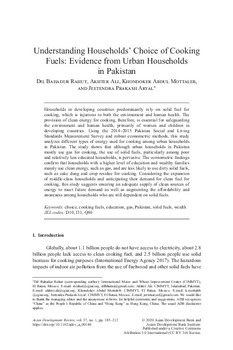Mostrar el registro sencillo del ítem
Understanding households’ choice of cooking fuels: evidence from urban households in Pakistan
| Creador: | Rahut, D.B. |
| Creador: | Ali, A. |
| Creador: | Mottaleb, K.A. |
| Creador: | Aryal, J.P. |
| Año: | 2020 |
| URI: | https://hdl.handle.net/10883/20969 |
| Formato: | |
| Lenguaje: | English |
| Editor: | MIT Press Journals |
| Copyright: | CIMMYT manages Intellectual Assets as International Public Goods. The user is free to download, print, store and share this work. In case you want to translate or create any other derivative work and share or distribute such translation/derivative work, please contact CIMMYT-Knowledge-Center@cgiar.org indicating the work you want to use and the kind of use you intend; CIMMYT will contact you with the suitable license for that purpose |
| Tipo: | Article |
| País de enfoque: | Pakistan |
| Lugar de publicación: | Cambridge, MA (USA) |
| Páginas: | 185-212 |
| Número: | 1 |
| Volumen: | 37 |
| DOI: | 10.1162/adev_a_00146 |
| Descripción: | Households in developing countries predominantly rely on solid fuel for cooking, which is injurious to both the environment and human health. The provision of clean energy for cooking, therefore, is essential for safeguarding the environment and human health, primarily of women and children in developing countries. Using the 2014–2015 Pakistan Social and Living Standards Measurement Survey and robust econometric methods, this study analyzes different types of energy used for cooking among urban households in Pakistan. The study shows that although urban households in Pakistan mostly use gas for cooking, the use of solid fuels, particularly among poor and relatively less educated households, is pervasive. The econometric findings confirm that households with a higher level of education and wealthy families mainly use clean energy, such as gas, and are less likely to use dirty solid fuels, such as cake dung and crop residue for cooking. Considering the expansion of middle-class households and anticipating their demand for clean fuel for cooking, this study suggests ensuring an adequate supply of clean sources of energy to meet future demand as well as augmenting the affordability and awareness among households who are still dependent on solid fuels. |
| Agrovoc: | COOKING |
| Agrovoc: | FUELS |
| Agrovoc: | EDUCATION |
| Agrovoc: | SOLID FUELS |
| ISSN: | 0116-1105 |
| Revista: | Asian Development Review |
Ficheros en el ítem
Este ítem aparece en la(s) siguiente(s) colección(ones)
-
Socioeconomics
Including topics such as farming systems, markets, impact & targeting, innovations, and GIS

